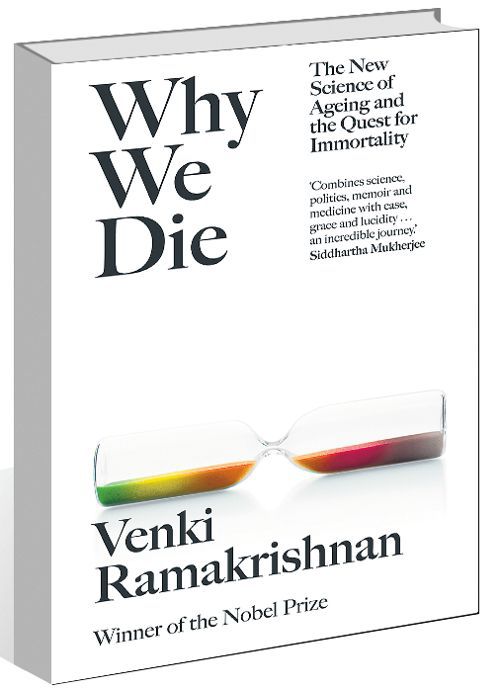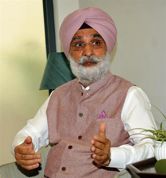
Why We Die: The New Science of Ageing and the Quest for Immortality by Venki Ramakrishnan. Hachette. Pages 318. Rs 699
Harjinder Singh
Death is sure to prevail one day/ Why am I then unable to sleep all night.
— Mirza Ghalib
Kaala, I’m your rival: You never fail/ I dwell undefeated in you/ Thus I immerse in your soul.
— Shamsher Bahadur Singh, Hindi poet
I can go/ Any which way I can go/ But why should I?
— Shakti Chattopadhyaya, Bangla poet
Commentaries on death are usually culture-specific and yet there is an obvious universal narrative on it. All the good things in life happen only when we are alive. Naturally, one asks the question — why we die? Dying is irreversible and it renders us non-functional. We know that death is inevitable; sooner or later, we all face it; it is extensive in its reach to all life in Nature, and yet we wish to avoid it, by whatever means possible. In ‘Why We Die’, Nobel laureate Venki Ramakrishnan (VR) tells us the comprehensive story of what and how modern science attempts in imparting a sense of meaning to this perennial enigma of ageing and dying.
The book is meant for popular reading and is adequately supported with authentic references for the more serious reader. It has a dozen chapters and right from the introduction, it reads quite smoothly, progressively adding rigorous scientific information. A former president of the Royal Society of Britain and a leading structural biologist, VR naturally presents mostly a story of the molecular biology of life and death. He is a remarkable storyteller and relates anecdotes from recent past on the lives of scientists, some of them mavericks. In the process, he also tells us about how science works. To quote: “...people follow their curiosities, and one thing leads to another... a story of persistence, insight, brilliance, and vision, but also chance encounters and sheer luck.”
The contexts of discovery and the logical structures of science are narrated beautifully. Not until about the middle of the book does the reader get the feeling that right from the beginning, frontier-level science was being handed to them in the guise of a story. It is common knowledge that nothing in the world of living organisms makes sense without the theory of evolution and its most essential features, namely natural selection and adaptation. However, the fact that evolution also explains how molecules of life, DNA, RNA, the proteins, and the rest of the cellular apparatus came to be, and the purpose behind it all, is not so widely known. VR does an excellent job of explaining the chemistry of ageing.
At a time when a lot of mumbo-jumbo on such subjects prevails, especially in this country, it is indeed quite reassuring to read genuine science in such lucid diction. The notion that only we as humans can understand death is a cultural construct. Animals experience death as much as we do and much of our understanding about ageing is based on research done on animals like rats. The book goes into interesting details from the history of science on the selection of particular animals for such research. There are nice illustrations accompanying the text that look like hand-drawn pictures. A few more of these would have helped the reader understand some of the complex issues of cellular chemistry discussed in chapters 5 to 9, especially when explaining the biochemical networks.
For those who look for more than the molecular games, learning about good health by moderate diet control is a bonus that the book offers and along with it, prophecies and fantasies are portrayed and philosophical questions are posed. The concluding chapter, ‘Should we live forever?’, gets into the profound concerns related to the social, cultural and ethical ramifications of enhanced lifespan in a style that is accessible to the ordinary reader. It is known that just before dying, most people resent that they have not lived as they desired, living rather as others expected of them. Observations of such simple nature to deeper explorations have perennially troubled thinking minds in all civilisations. Buddha addressed it by marking desire as the cause of all suffering, and emphasised upon loving others and staying in the present. The story of Yayati tells us that even if someone could live young for a 1,000 years — as he could by exchanging his age with son Puru — the thirst is never quenched and eventually, the destined share of misery falls on everyone. Immortality may be worse than death. Bhishma was blessed to live as long as he wishes, and when not ready to die after falling in battle, he had to lie on a bed of arrows. In ‘Gulliver’s Travels’, there is an encounter with humans who live forever. Rather than being happy, they never stop ageing, eventually becoming insane, shunned by others. A century ago, Heidegger devoted much of his work to the relationship between death awareness and a life of contentment. His work inspired Sartre and other existentialist thinkers. While others see awareness of mortality as a philosophical solution to find meaning of life, VR is more concerned as a scientist about real issues like inter-generational conflicts, cognitive decline with age in individuals, quality of productive work by the elderly, etc.
VR is a decent global citizen with a Sufi-like perspective on humanity that transcends borders and cultural divisions and yet, he is rightly critical of ethical misconduct by leading scientists. It is interesting to learn that the best of minds fall into the traps of fame and glory and how companies push for not yet proven cures and pharmaceuticals, often violating ethical norms. One cannot avoid recalling how political patronage has allowed gross violations by pharma companies in India, resulting in marketing of contaminated medicines, causing many deaths here and in other countries.
Of course, not all curiosities on the subject of death can be covered in a book of this size. One philosophical perspective comes from the general theory of relativity (GTR) — ‘past’ and ‘future’ are relative to each individual observer, and hence there may be no absolute meaning of death. Perhaps, someday, we will know about the connections between GTR and molecular biology.
Join Whatsapp Channel of The Tribune for latest updates.



























